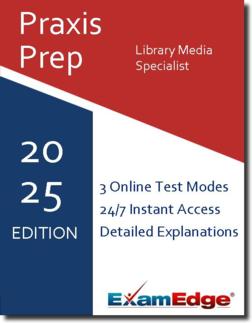Praxis Library Media Specialist (5311) Practice Tests & Test Prep by Exam Edge - Topics
Based on 25 Reviews
- Real Exam Simulation: Timed questions and matching content build comfort for your Praxis Library Media Specialist test day.
- Instant, 24/7 Access: Web-based Praxis Library Media Specialist practice exams with no software needed.
- Clear Explanations: Step-by-step answers and explanations for your Praxis exam to strengthen understanding.
- Boosted Confidence: Reduces anxiety and improves test-taking skills to ace your Praxis Library Media Specialist (5311).

Understanding the exact breakdown of the Praxis Library Media Specialist test will help you know what to expect and how to most effectively prepare. The Praxis Library Media Specialist has 120 multiple-choice questions The exam will be broken down into the sections below:
| Praxis Library Media Specialist Exam Blueprint | ||
|---|---|---|
| Domain Name | % | Number of Questions |
| Program Administration | 18% | 22 |
| Collection Development | 21% | 25 |
| Information Access and Delivery | 21% | 25 |
| Learning and Teaching | 28% | 34 |
| Professional Development Leadership, and Advocacy |
12% | 14 |


